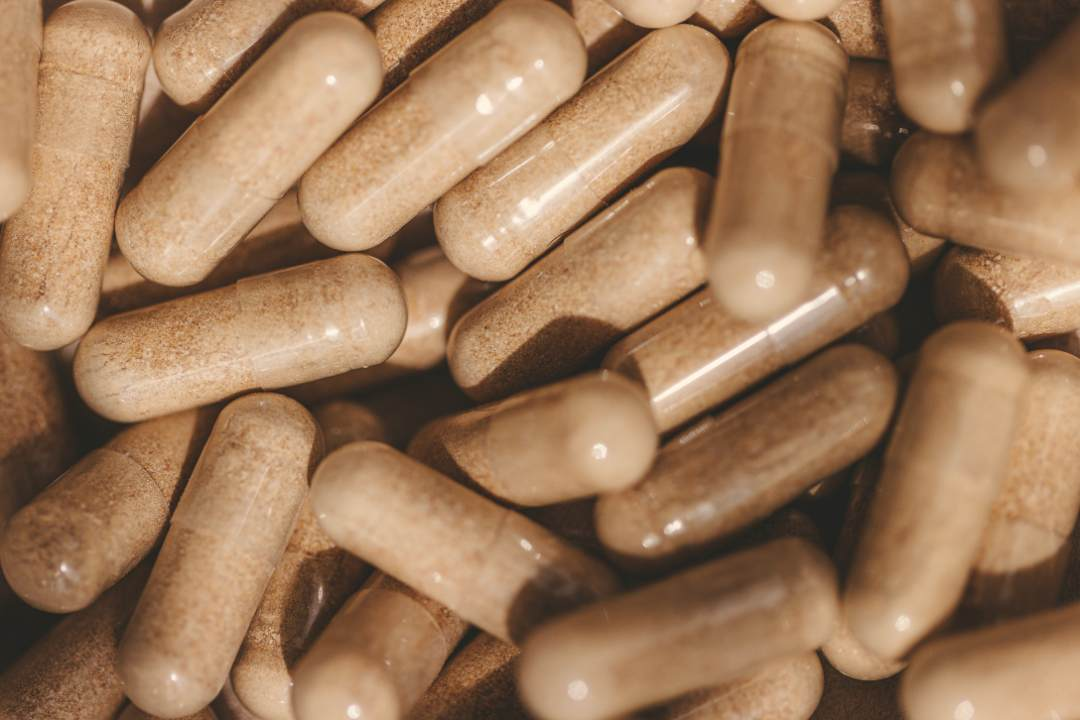
The Health Benefits of Ashwagandha
Share
Are you looking for a natural way to reduce stress, boost cognitive function, and improve overall health? Look no further than Ashwagandha. This powerful adaptogenic herb has been used for centuries in traditional Ayurvedic medicine, and now modern research is uncovering the fantastic health benefits of this ancient plant. In this blog post, we’ll explore the fascinating world of Ashwagandha, including its origins, properties, and the scientific evidence behind its numerous health benefits. So, let’s dive in and uncover the secrets of this incredible herb!
Key Takeaways
Ashwagandha is an adaptogenic shrub with scientifically proven health benefits such as stress relief, cognitive enhancement, anti-inflammatory properties and hormonal balance.
Potential side effects include digestive issues and liver problems. Pregnant women, breastfeeding women and those with autoimmune conditions should consult a healthcare professional before taking Ashwagandha supplements.
Choosing the right Ashwagandha supplement at the recommended dosage for up to 3 months can help ensure safe and effective use.
Ashwagandha Unveiled: Origins and Properties

Ashwagandha root, scientifically known as Withania somnifera, is an evergreen shrub native to Asia and Africa. The ashwagandha root extract has been highly valued for its potential health benefits, including:
Improving brain and nervous system function
Boosting memory
Balancing sexual and reproductive health
Enhancing stress resilience
Strengthening the body’s immunity
The Nagori Ashwagandha deemed the highest quality of all Ashwagandha varieties, is often available in powder form and used in traditional Ayurvedic treatments.
Ashwagandha distinguishes itself from other herbs through its adaptogenic qualities. Adaptogens are natural substances that help the body adapt to various stressors, promoting overall well-being and resilience. Recognized as a potent adaptogen, Ashwagandha boasts a credible record of positively influencing physical and mental health by efficiently responding to stressors. Shop our collecton of Adaptogen products.
Indian Ginseng and Winter Cherry
Several other names, including Indian Ginseng and Winter Cherry, are known as ashwagandha. Indian Ginseng has been observed to have potential benefits in regulating blood sugar levels, making it a natural remedy for those looking to lower blood sugar levels. Scientific studies, including placebo-controlled studies, have demonstrated that Ashwagandha can offer various health benefits, such as stress relief, enhancement of cognitive function, and anti-inflammatory properties.
The use of Ashwagandha, or Winter Cherry, in Ayurvedic medicine dates back thousands of years. This revered herb has addressed various health concerns, including stress-related disorders, anxiety symptoms, and inflammatory conditions. The numerous health benefits of Ashwagandha are backed by scientific evidence, making it a popular choice for those seeking natural remedies to improve their overall wellbeing. Shop our Ashwagandha Supplement collection.
Adaptogenic Qualities
Ashwagandha’s adaptogenic qualities distinctively separate it from other herbs. These qualities help the body adapt to various stressors, such as environmental, physical, and emotional stress. Ashwagandha promotes overall well-being and resilience by enhancing the body’s ability to cope with stress.
Ashwagandha is available in various forms, such as churn (a finely sieved ashwagandha powder), capsules, and ashwagandha extract in liquid form. These different forms of Ashwagandha may allow users to flexibly benefit from its adaptogenic properties, integrating this potent herb into their everyday regimen.
The Science Behind Ashwagandha's Health Benefits

Contemporary scientific research is progressively decoding the mysteries behind Ashwagandha’s myriad health benefits. Studies have shown that this ancient herb can effectively reduce stress and anxiety, promote restful sleep, and improve cognitive functioning in specific populations. Furthermore, research suggests that Ashwagandha may improve athletic performance, sleep quality, and anxiety reduction, soothe the brain, reduce inflammation, lower blood pressure, and support the immune system.
Clinical trials and research substantiate Ashwagandha’s effectiveness in enhancing overall health and well-being. Many clinical trials have demonstrated the benefits of Ashwagandha in areas such as stress relief, cognitive function enhancement, and anti-inflammatory properties. As additional research continues to be conducted, the full potential of this powerful adaptogenic herb becomes even more apparent.
Stress Relief and Anxiety Reduction

Ashwagandha is renowned for its capability to alleviate stress and anxiety. Research has demonstrated that this ancient herb can effectively alleviate stress, anxiety, and even depression, with an antidepressant effect comparable to imipramine. By reducing cortisol levels and promoting a calming effect on the brain, Ashwagandha can help improve sleep quality and overall physical and mental health.
Robust scientific research, in addition to anecdotal evidence, affirms Ashwagandha’s stress-relieving benefits. Numerous peer-reviewed studies and placebo-controlled trials have demonstrated the effectiveness of Ashwagandha in reducing stress and anxiety symptoms. With its adaptogenic and anxiolytic effects, Ashwagandha has gained recognition as a powerful natural remedy for stress relief and anxiety reduction.
Cognitive Function Enhancement

Another promising research area is Ashwagandha’s potential to bolster cognitive function. Studies have shown that this powerful herb can improve memory, focus, and reaction times, making it a potential treatment option for neurodegenerative diseases such as Alzheimer’s and Parkinson’s. Ashwagandha can help optimize cognitive performance and overall brain health by supporting healthy brain function and promoting neuroplasticity.
Various clinical trials, including a placebo-controlled clinical study and other placebo-controlled study designs such as randomized controlled trials, uphold Ashwagandha’s cognitive-enhancing properties in healthy adults. These studies have demonstrated the potential of Ashwagandha in improving cognitive function in healthy individuals and those with cognitive dysfunction or impairment.
Continuous research on Ashwagandha’s cognitive benefits reveals the herb’s vast potential in advocating for optimal brain health and functionality, including its positive impact on the central nervous system.
Anti-inflammatory and Pain Relief Properties

Ashwagandha has been found to possess potent anti-inflammatory and pain-relieving properties, making it a potential treatment option for conditions such as arthritis and other inflammatory diseases. Studies have shown that Ashwagandha can reduce inflammation and relieve pain by inhibiting the production of pro-inflammatory cytokines and promoting the release of anti-inflammatory compounds.
The anti-inflammatory benefits of Ashwagandha have been demonstrated in both animal and human studies, with research suggesting that this powerful herb can help reduce inflammation and alleviate pain associated with various inflammatory conditions. By offering a natural and effective alternative to conventional pain relief medications, Ashwagandha has become a popular choice for those seeking to manage inflammation and pain holistically.
Ashwagandha and Hormonal Balance

In addition to its numerous other health benefits, Ashwagandha has also positively impacted hormonal balance. Research suggests that this powerful herb can help regulate hormones produced and secreted by the brain, helping normalize blood hormone levels and promote a healthy sexual and reproductive balance. Furthermore, Ashwagandha has been shown to improve memory and cognitive function, which hormonal balance can also influence.
Ashwagandha’s influence on hormonal balance extends to thyroid hormone regulation and testosterone production. This adaptogenic herb has been found to:
Stimulate the production of T3 and T4 thyroid hormones
Reduce inflammation in the thyroid gland, thereby enhancing its functioning
Regulate testosterone production by raising luteinizing hormone (L.H.) and follicle-stimulating hormone (FSH) levels
These properties make Ashwagandha a potential natural remedy for those with hormonal imbalances.
Thyroid Hormone Regulation

Ashwagandha’s potential benefits for thyroid hormone regulation are particularly noteworthy. Research has indicated that this powerful herb may effectively stimulate the endocrine system and boost thyroid hormone levels by reducing cortisol. In addition, Ashwagandha has been found to normalize thyroid indices in subclinical hypothyroid patients, suggesting that it may benefit individuals with thyroid conditions.
While the extent of Ashwagandha’s impact on thyroid hormone regulation remains fully understood, the existing research suggests that this adaptogenic herb may benefit those with thyroid conditions. By helping to regulate thyroid hormone levels and reduce inflammation in the thyroid gland, Ashwagandha may provide a natural and effective treatment option for individuals seeking to improve their thyroid health or explore alternatives to thyroid hormone medications.
Testosterone Boost and Male Fertility

Another growing interest is Ashwagandha’s potential to boost testosterone levels and improve male fertility. Research has demonstrated that this ancient herb can:
Increase testosterone levels
Increase luteinizing hormone (L.H.)
Increase follicle-stimulating hormone (FSH), which is involved in testosterone production
Additionally, Ashwagandha has been proven to reduce stress, which can further enhance testosterone production.
Studies have also shown that Ashwagandha can improve male fertility by enhancing sperm quality and count. This powerful herb has increased sperm motility, concentration, and overall sperm quality, making it a potential natural remedy for those struggling with male infertility.
With its testosterone-boosting and fertility-enhancing properties, Ashwagandha offers promising potential for men seeking to improve their reproductive health.
Ashwagandha's Influence on Physical Performance and Energy

Ashwagandha’s potential to positively influence physical performance, strength, and energy levels is another growing area of interest. Research has indicated that supplementation with Ashwagandha can result in significant improvements in:
Muscle mass
Strength
Cardiovascular function
Exercise performance
Energy levels
Additionally, Ashwagandha has been demonstrated to reduce anxiety, which can indirectly positively influence physical performance.
Numerous clinical trials and research studies back the impact of Ashwagandha on physical performance and energy. Many of these studies have focused on the effects of Ashwagandha supplementation on athletic performance, muscle growth, and strength, providing compelling evidence for the potential benefits of this powerful adaptogenic herb in supporting optimal physical performance and overall health.
Muscle Growth and Strength
One of the most exciting aspects of Ashwagandha’s potential health benefits is its ability to promote muscle growth and strength. Studies have demonstrated that supplementation with Ashwagandha can result in:
Significant increases in muscle mass, strength, and power output
Reduced fatigue and improved recovery time following physical activity
Reduction in body fat percentage
Improvement in cholesterol levels
These findings make Ashwagandha a promising natural remedy for those seeking to improve their physical health and well-being.
Rigorous scientific research, including controlled clinical trials, supports Ashwagandha's muscle growth and strength-promoting properties. These studies have demonstrated the potential of Ashwagandha to enhance muscle growth and strength in healthy individuals and those with muscle-wasting conditions. As research continues to explore the full extent of Ashwagandha’s impact on muscle growth and strength, it becomes clear that this ancient herb has much to offer in terms of promoting optimal physical health and performance.
Endurance and Cardiovascular Health
In addition to its muscle growth and strength-enhancing properties, Ashwagandha has also been found to improve endurance and cardiovascular health. Research has shown that supplementation with Ashwagandha can significantly increase VO2 max levels, which indicates a healthy heart that can function optimally during physical activity.
Furthermore, Ashwagandha has been demonstrated to support overall heart health, making it a promising natural remedy for those seeking to improve their cardiovascular fitness and endurance.
Numerous clinical trials, including randomized controlled trials, support Ashwagandha's endurance and cardiovascular health-promoting properties. These studies have demonstrated the potential of Ashwagandha to enhance endurance and cardiovascular health in healthy individuals and those with cardiovascular conditions.
As research continues to explore the full extent of Ashwagandha’s impact on endurance and cardiovascular health, it becomes clear that this ancient herb has much to offer to promote optimal physical performance and overall health.
Potential Side Effects and Precautions

Despite Ashwagandha’s wide range of health benefits, it’s crucial to note the potential side effects and precautions related to its use. After taking Ashwagandha supplements, some individuals may experience gastrointestinal disturbances, such as stomach upset, diarrhoea, and vomiting. Additionally, there have been reports of potential liver issues, including itching of the skin and jaundice, in some users.
Due to potential risks and complications, pregnant and breastfeeding women and individuals with autoimmune conditions should be cautious with Ashwagandha intake. Pregnant women are not recommended to take Ashwagandha, as it may increase the risk of miscarriage and early onset of menstruation. Additionally, individuals taking medications for diabetes, high blood pressure, or other conditions should consult a healthcare professional before incorporating Ashwagandha into their regimen, as it may interact with these medications.
Digestive Issues and Liver Health
Digestive issues are among the potential side effects associated with Ashwagandha supplementation. Some individuals may experience stomach upset, diarrhea, or vomiting after taking Ashwagandha supplements. While these symptoms are generally mild and temporary, it is essential to be aware of the potential risks and to consult a healthcare professional if symptoms persist or worsen.
In addition to digestive and kidney diseases, Ashwagandha has also been linked to potential liver problems. While rare, some users have reported experiencing itching of the skin or jaundice after taking several mg of Ashwagandha supplements. It is crucial to consult a healthcare professional if you experience any signs of liver problems while taking Ashwagandha and to discontinue use if advised.
Pregnancy, Breastfeeding, and Autoimmune Conditions
Pregnant and breastfeeding women should exercise caution when considering using Ashwagandha supplements. Research suggests that taking Ashwagandha during pregnancy may increase the risk of miscarriage and early onset of menstruation, making it potentially unsafe for pregnant women. It is best to avoid taking Ashwagandha during pregnancy and to consult a healthcare professional if you are considering using this herb while breastfeeding.
Individuals with autoimmune conditions, such as rheumatoid arthritis, lupus, and multiple sclerosis, should also be cautious when using Ashwagandha supplements. As an adaptogenic herb, Ashwagandha may potentially interact with the immune system and exacerbate symptoms of autoimmune conditions. It is essential to consult a healthcare professional before incorporating Ashwagandha into your regimen if you have an autoimmune condition.
Choosing and Using Ashwagandha Supplements

Understanding the various available forms, recommended dosages and usage duration is critical in selecting and utilising Ashwagandha supplements. Ashwagandha powder comes in a variety of forms, such as:
capsules
powders
tinctures
tablets
liquid extracts
The appropriate dosage of Ashwagandha may vary depending on the form of the supplement and individual health requirements, making it crucial to consult a healthcare professional to determine the optimal dosage and duration of use.
In addition to understanding the various forms and dosages of Ashwagandha, you must consider the quality and safety of the dietary supplements you choose. Look for products independently tested for safety and potency by organizations such as the U.S. Pharmacopeia, ConsumerLab, and NSF International, all pharmaceutical test providers. The U.S. Pharmacopeial Convention (USP) is also a trusted certifying institution. By selecting high-quality Ashwagandha supplements and following the guidance of a healthcare professional, you can safely and effectively experience the numerous health benefits this powerful adaptogenic herb offers.
Forms of Ashwagandha
The availability of Ashwagandha supplements in multiple forms offers flexibility in integrating this potent herb into your daily regimen. Some of the most common forms of Ashwagandha include:
Capsules
Tablets
Powders
Tinctures
Teas
Each form offers unique benefits and ease of use, allowing you to choose the one that best suits your needs and preferences.
When selecting the appropriate form of Ashwagandha for your needs, it is essential to consider factors such as convenience, taste, and ease of use. Here are some options to choose from:
Capsules and tablets: easy to take on the go
Powders and tinctures: can be mixed into beverages or added to recipes
Teas: provide a soothing and enjoyable way to enjoy the benefits of Ashwagandha in a relaxing ritual
Ultimately, your form of Ashwagandha will depend on your needs and preferences.
Dosage Recommendations and Duration
Recommended Ashwagandha dosages can differ based on the supplement form and individual health needs. Generally, dosages range from 300mg to 1000mg daily, with higher doses potentially beneficial for athletes seeking to optimize their physical performance. It is suggested to use Ashwagandha supplements for up to 3 months, with the possibility of increasing the duration under the guidance of a healthcare professional.
Determining the appropriate dosage and duration of Ashwagandha supplementation is crucial for ensuring optimal results and minimizing potential risks. Consulting a healthcare provider is essential for accurately assessing your needs and determining the most suitable dosage and duration for your situation. By following professional guidance, you can safely and effectively experience the numerous health benefits of Ashwagandha.
Summary
In conclusion, Ashwagandha is a powerful and versatile adaptogenic herb with a rich history in traditional Ayurvedic medicine. Modern research has uncovered numerous health benefits, including stress relief, cognitive function enhancement, anti-inflammatory properties, hormonal balance, and improved physical performance. While some potential side effects and precautions should be considered, most individuals can safely incorporate Ashwagandha into their daily routine to experience its many health-promoting effects. By choosing high-quality supplements and consulting with a healthcare professional for proper dosage and duration, you can unlock the incredible potential of this ancient herb and embark on a journey towards improved overall health and well-being.
Frequently Asked Questions
What are the 12 benefits of ashwagandha?
Ashwagandha offers many health benefits, such as reducing stress and anxiety, improving cognitive function, boosting energy levels, regulating blood sugar levels, lowering blood pressure, improving cardiac health, reducing inflammation and pain, and supporting immunity. It can also boost athletic performance, improve memory, increase male fertility, and manage blood sugar.
Is it OK to take Ashwagandha every day?
It is generally safe to take ashwagandha daily for up to three months in dosages of 250–500 mg; however, speaking with a healthcare provider to determine the most effective dosage and duration of ashwagandha root extract use for your individual needs is essential.
Do I take Ashwagandha in the morning or night?
Ashwagandha can be taken at any time of day; however, some people prefer to take it in the evening before bed or in the morning for a calmer and more relaxed start to their day. It is essential to consult with your healthcare provider before taking any new supplement.
How should I feel after taking Ashwagandha?
Taking ashwagandha can help calm the central nervous system down, reduce stress, and improve sleep quality. Doses ranging from 250-1,250 mg per day are effective, and it can be taken any time, morning or night. With its calming effects and potential to boost stamina, cognition, and focus, you should feel more relaxed and energized after taking ashwagandha.
What is Ashwagandha?
Ashwagandha is an evergreen shrub with adaptogenic properties that may help improve brain function, reduce stress, and support immune health.
